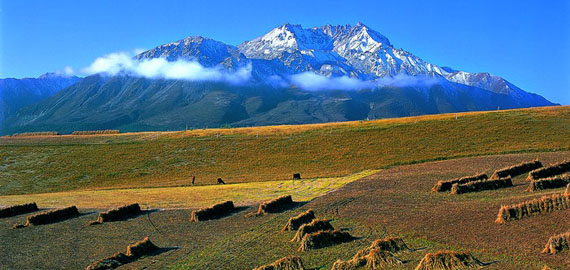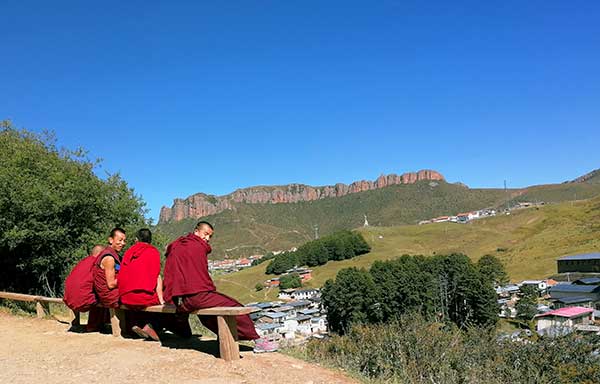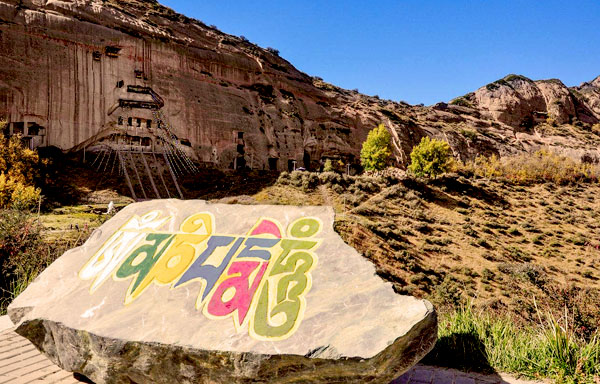- By admin
- In the silk road knowledge
- 2013-04-22
The artery of the Silk Road-Gansu Hexi Corridor

Hexi Corridor, also Hexi Zoulang, which is known as the main path of the ancient Silk Road, is a east-west stretching trading route starting from the ancient capital Xian and reaching Dunhuang via oasis scattering in the long and narrow desert between Lanzhou and the northern part of the Qilian Mt. Range. For reasons of simple geography, travellers leaving or entering China to or from Central Asia and the West have always been channelled through this narrow strip of land that runs 1000km northwest of Lanzhou.
With the foothills of the Tibetan plateau, in the form of the Qilian Shan range, soaring up to the south, and a merciless combination of waterless desert and mountain to the north, the Hexi Corridor offers the only feasible way through the physical obstacles that crowd in on the west of Lanzhou.
Historically, given the total absence of alternative routes, whoever controlled the Hexi Corridor could operate a stranglehold on the fabulous riches of the Silk Road trade. Inevitably the Chinese took an interest from the earliest times, and a certain amount of Great Wall-building was already taking place along the Hexi Corridor under Emperor Qin Shi Huang in the third century BC. Subsequently, the powerful Han dynasty succeeded in incorporating the region into their empire, though the influence of central government remained far from constant for many centuries afterwards, as Tibetans, Uigurs and then Mongols vied for control. Not until the Mongol conquests of the 13th century did the corridor finally become a settled part of the Chinese empire, with the Ming consolidating the old Great Wall positions and building its magnificent last fort at Jiayuguan .
Two other towns along the corridor, Wuwei and Zhangye , offer - at the very least - convenient means of breaking the long journey from Lanzhou to Dunhuang, and are well worth visiting in themselves, particularly Wuwei with its substantial historic remains.
Explore the Hexi Corridor
Famous historic sites along the Hexi Corridor include the Mogao Grottoes, Yumen Pass and Yangguan Pass ,Yulin Grottoes and Suoyang Castle in Dunhuang ; The Giant Buddha Temple and Matisi Grottoes in Zhangye, Confucious Temple in Wuwei, Jiayuguan Pass and Great Wall remains of Han and Ming Dynasties. Oasis, Gobi, desert, grassland, snow mountain, glacier and Yardan landform are all grand and wonderful. Yugur minority, exist exclusively in Gansu, and Kazakstan, Mongolia and Tujia nationalities have remained their traditional culture and folk-custom. Hexi Corridor travel route is reputed as "The Golden Section of the Silk Road".
Related destinations
Why Choose Us?
We are the top Silk Road tour operator based in Dunhuang, China. We focus on providing well designed Silk Road China Tours with resonable price and thoughtful service.
- Easy & carefree booking
- The best value
- Great travel experience
- Locally operated
Hot Tours
-

6 days Gansu tour to Binglingsi, Xiahe and Langmusi
Tour type : Private tour Price : from *** Destinations : Lanzhou - linxia - Xiahe - Langmusi - Hezuo - Lanzhou -

12 Days Gansu Highlights Tour
Tour type : Private tour Price : from *** Destinations : Xian – Tianshui – Lanzhou – Xiahe – Langmusi – Hezuo – Zhangye – Jiayuguan - Dunhuang -

10 Days Silk Road Classic Tour
Tour type : Private tour Price : from *** Destinations : Xian - Zhangye - Jiayuguan - Dunhuang - Turpan - Urumqi -

5 Days Zhangye - Alxa youqi Highlights Tour
Tour type : Private Tour Price : from *** Destinations : Zhangye - Alax youqi - Zhangye

